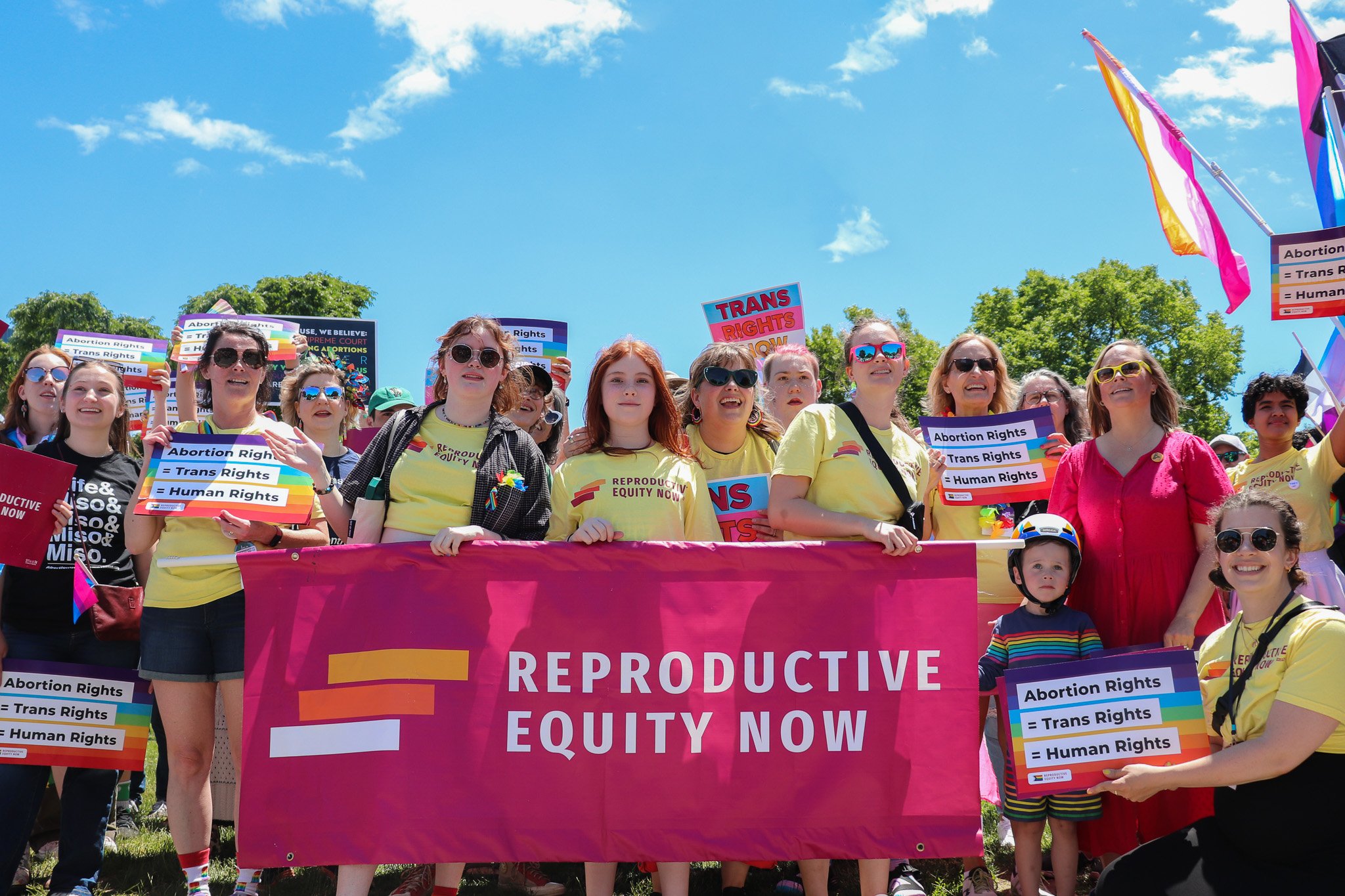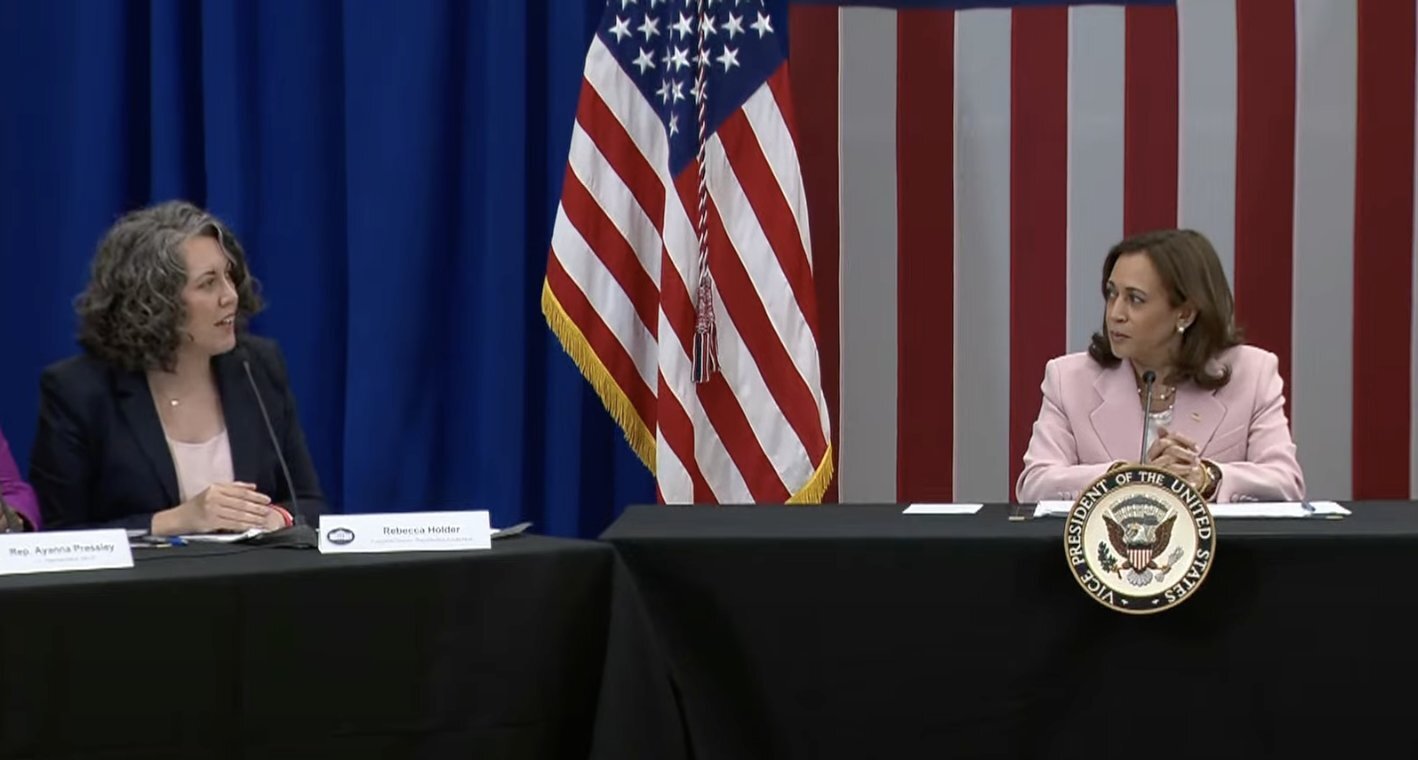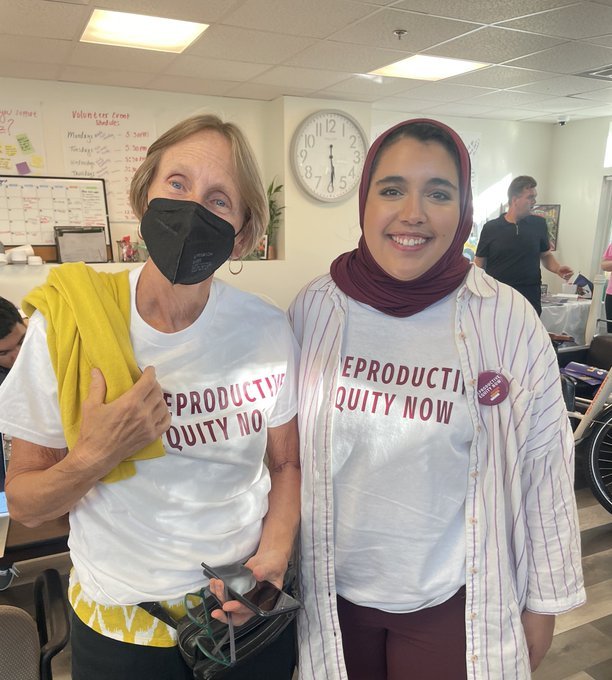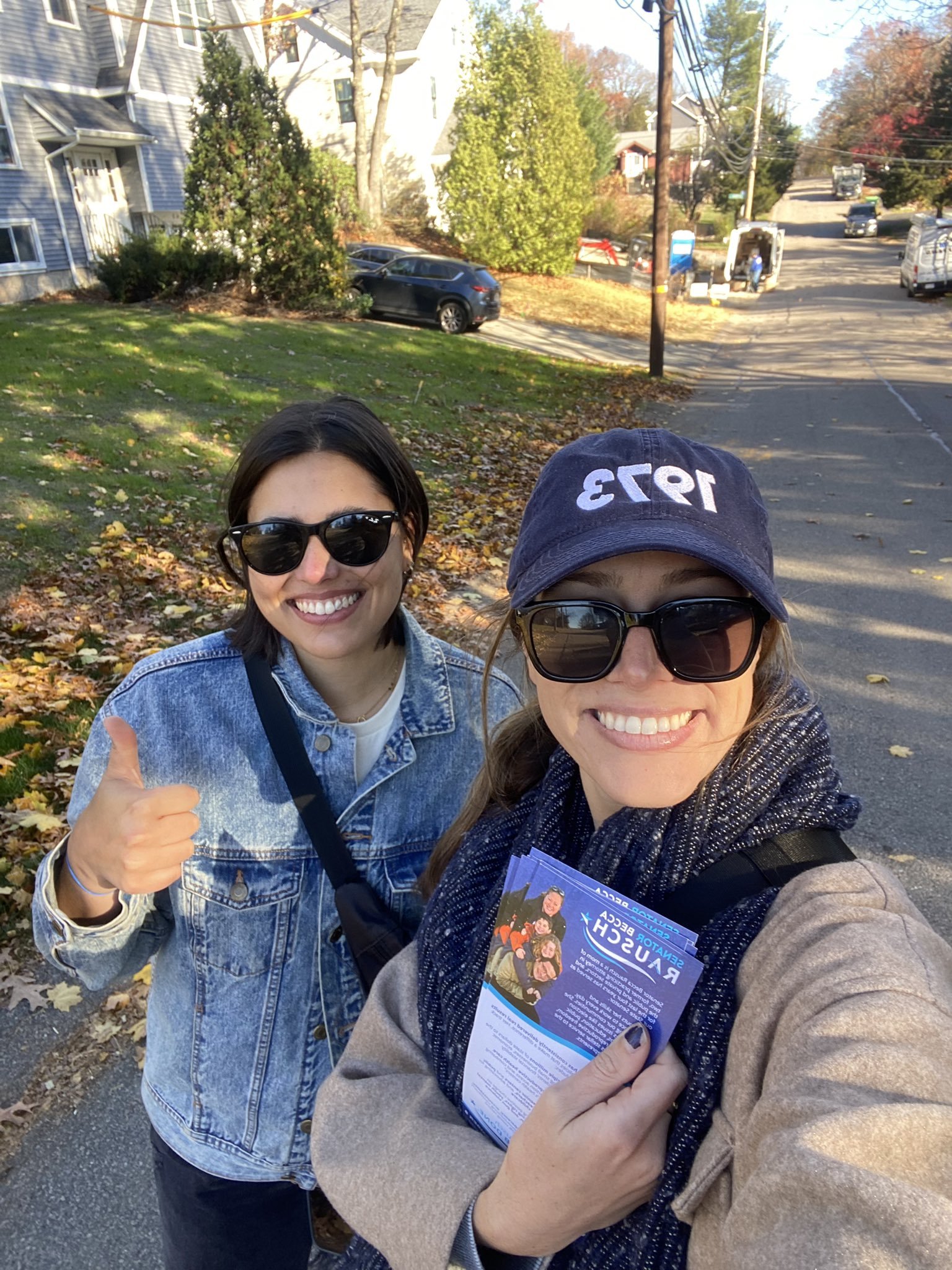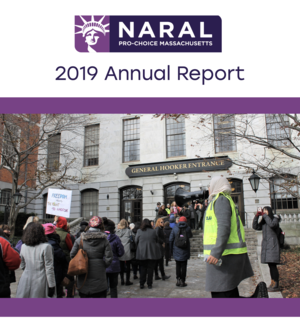Reproductive Equity Now 2022 Annual Report
This year was filled with unprecedented and, frankly, devastating challenges for reproductive freedom. The fall of Roe was not just a blow to gender equality—it was devastating for LGBTQIA+ rights, racial justice, immigrant justice, low-income people, and the list goes on and on.
Because of your support, Reproductive Equity Now mobilized, advocated, and made major progress in the fight for equitable access to reproductive health care for all. Take a look at all Reproductive Equity Now has done this year to respond to the fall of Roe v. Wade and expand abortion access in Massachusetts.
A Note from Reproductive Equity Now President Rebecca Hart Holder:
-
Dear Friends,
On May 2, 2022, a little after 8 p.m., I sat, stunned, in silence. Politico had just leaked the Dobbs decision and it was far more devastating than I could have ever imagined.
I knew this day was coming. For years, I had predicted that Roe would fall. But at that moment, I could barely process the words on the page. Not only would the Supreme Court strip millions of people of essential healthcare, but Justice Alito had written an opinion filled with such rage and bigotry that it took my breath away.
Moments later, I received a text from Boston Mayor Michelle Wu, who was ready to get to work. She asked me what the plan was to respond and I realized, right then and there, that my shock had to give way to action. So, I wiped my tears, gathered the team, and we kicked into high gear.
The very next morning, with the help of Mayor Wu’s team, Reproductive Equity Now organized a press conference in front of the State House to show a unified force in Massachusetts that would stand up against anti-abortion extremism. We were joined by Congresswoman Katherine Clark, Senate President Karen Spilka, Speaker Ron Mariano, and U.S. Attorney Rachael Rollins, among many others.
We began crafting the Beyond Roe Agenda, a set of policy recommendations that would carry our Commonwealth into a post-Roe world. For months, we had been working on a memo to outline the response to the fall of Roe, but now it was time to implement the change we wanted to see.
In the face of injustice, Reproductive Equity Now stood up. We mobilized and we made Massachusetts’ values very clear: Our Commonwealth will protect every person’s right to safe, legal, and compassionate abortion care.
In our 2022 Annual Report, you will see the details of the work we did throughout the year to advance reproductive equity. What you won’t see is the behind-the-scenes story of our staff. How each and every person stepped up and worked harder than they ever have before to transform Massachusetts. How Claire, Rory, Taylor, Kayla, Jane, Sarah Lee, and Marcel left it all on the field to pass bold legislation. The late nights and early mornings. The tears, the anger, the stress. The way we leaned on one another to keep going. Reproductive Equity Now’s success would not be possible without this amazing group of fighters.
From meetings with legislators, to meetings with the Attorney General’s office and our senators, to press interviews, and rallies with our supporters, we remained focused, determined, and resilient in the face of unprecedented injustice. It was the moment Reproductive Equity Now was built for.
We believe in our bones that reproductive freedom is necessary for true justice. But we were able to keep going because all of you believe in us. You make our work possible each and every day and, together, we will never stop working for a more equitable and just future.
With gratitude,
Becca
The Rundown
Preparing for the Fall of ROE
January - May
From the moment Amy Coney Barrett was confirmed to the United States Supreme Court in 2020, we knew that the fall of Roe v. Wade was near. When the decision came in June of this year, Reproductive Equity Now was ready to act. Along with our partners at ACLU of Massachusetts and Planned Parenthood League of Massachusetts, we launched our Beyond Roe Agenda, a set of policy proposals to carry Massachusetts into a post-Roe world. We mobilized advocates and volunteers to stand up and demand bold reproductive equity policy.
Our Legislative Response
June - August
At this moment of crisis, we knew Massachusetts could pave the way forward for abortion access and take meaningful action to promote reproductive freedom. Reproductive Equity Now successfully advocated for a major reproductive health law this summer to make abortion care more affordable and accessible, protect our reproductive and gender-affirming care providers, and ensure no one must leave the Commonwealth for care, at any point in their pregnancy. Our advocacy work was recognized by Vice President Kamala Harris who traveled to Boston in August to tout Massachusetts’ national leadership.
Abortion On the Ballot
August - November
Abortion was on the ballot in races across the country this Election Day. In Massachusetts, 140 Reproductive Equity Now-endorsed candidates won their elections, up and down the ballot, reaffirming voters’ strong support for state elected leaders who unequivocally support reproductive freedom. Throughout the primary and general elections, Reproductive Equity Now volunteers made contact with thousands of voters across the state, hosting weekly phone and text banks and knocking hundreds of doors. We made it clear: abortion is a winning issue.

Preparing for the Fall of ROE
January - May
Abortion Care Guide
As New England prepared to see an influx of patients traveling for abortion care, the Reproductive Equity Now Foundation launched a first-of-its-kind New England Abortion Care Guide to serve as a one-stop resource for pregnant people throughout the region, and beyond, to learn about care options available to them.
The online guide allows users to search by zip code for local hospitals and clinics that provide abortion care, and provides information about state-by-state abortion costs, abortion funds, and health care coverage.
When a user searches by zip code, the resource also flags nearby crisis pregnancy centers, or fake clinics that masquerade as legitimate health care providers. These dangerous and deceptive clinics purport to offer comprehensive reproductive health care when, in reality, the facilities aim to manipulate and dissuade pregnant people from receiving abortions.
Beyond Roe Agenda
Reproductive Equity Now spent the beginning of 2022 preparing for the fall of Roe, identifying gaps in reproductive health care in Massachusetts, and drafting policy proposals to break down barriers to care that exist. Along with our partners at ACLU of Massachusetts and Planned Parenthood League of Massachusetts, we launched the Beyond Roe Agenda, a set of policy recommendations for legislative action, budget investments, and regulatory solutions that Massachusetts could adopt to advance reproductive equity in a post-Roe America. Over a dozen of our recommendations were implemented as part of the reproductive health care law that passed in July!
‘Next steps Beyond
Roe v Wade’
“Our leaders and policymakers have an opportunity and an obligation to meet this moment with bold legislative action, budget investments, and regulatory solutions to remove barriers to care and ensure meaningful access to abortion.”
Rally on the Common
In May, Reproductive Equity Now, along with our partners at Planned Parenthood League of Massachusetts and the ACLU of Massachusetts, responded to the leaked Dobbs draft by mobilizing over 10,000 people to rally on the Boston Common. Together, we called for passage of our Beyond Roe Agenda and made it clear that Massachusetts would stand up for reproductive freedom.

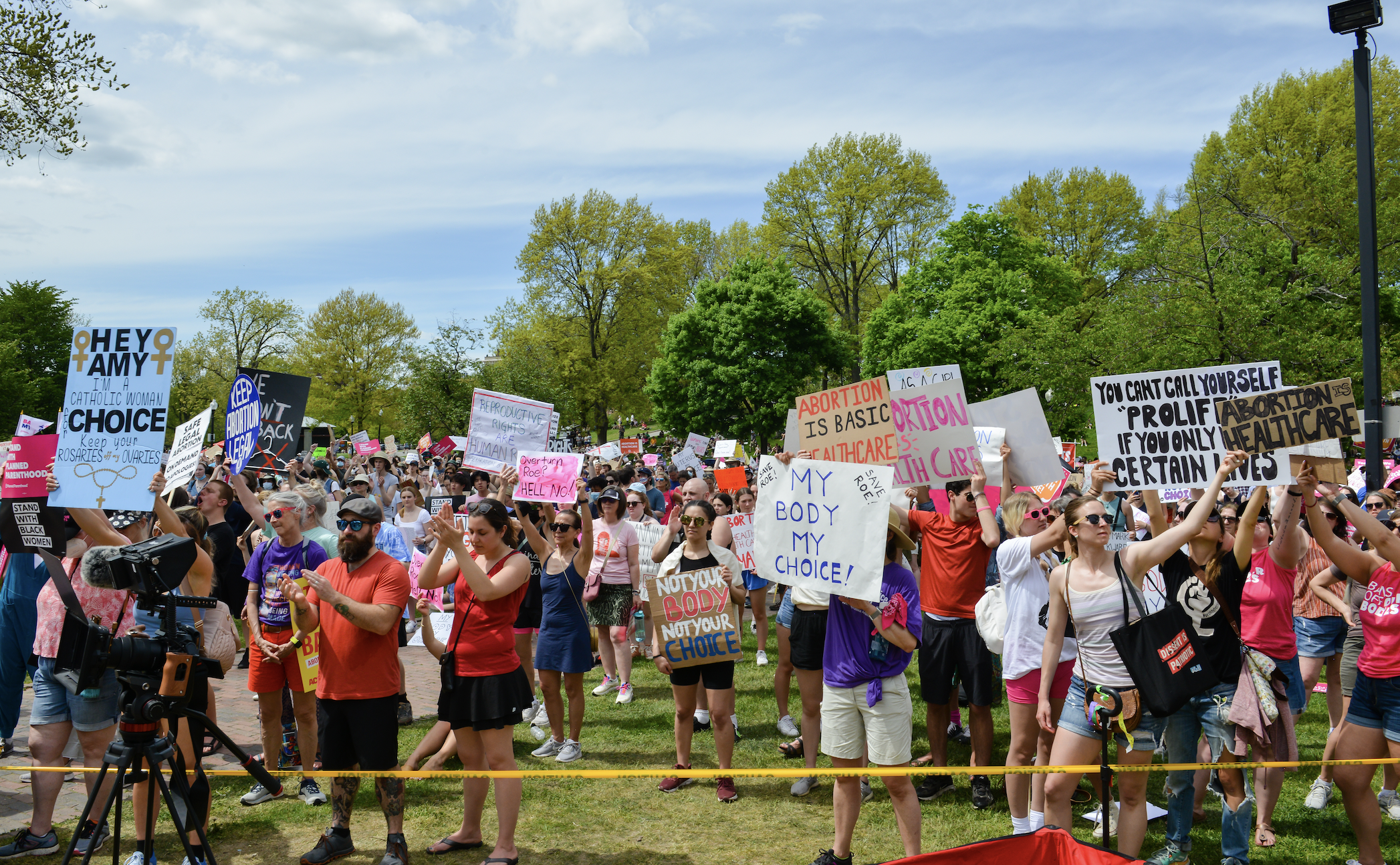

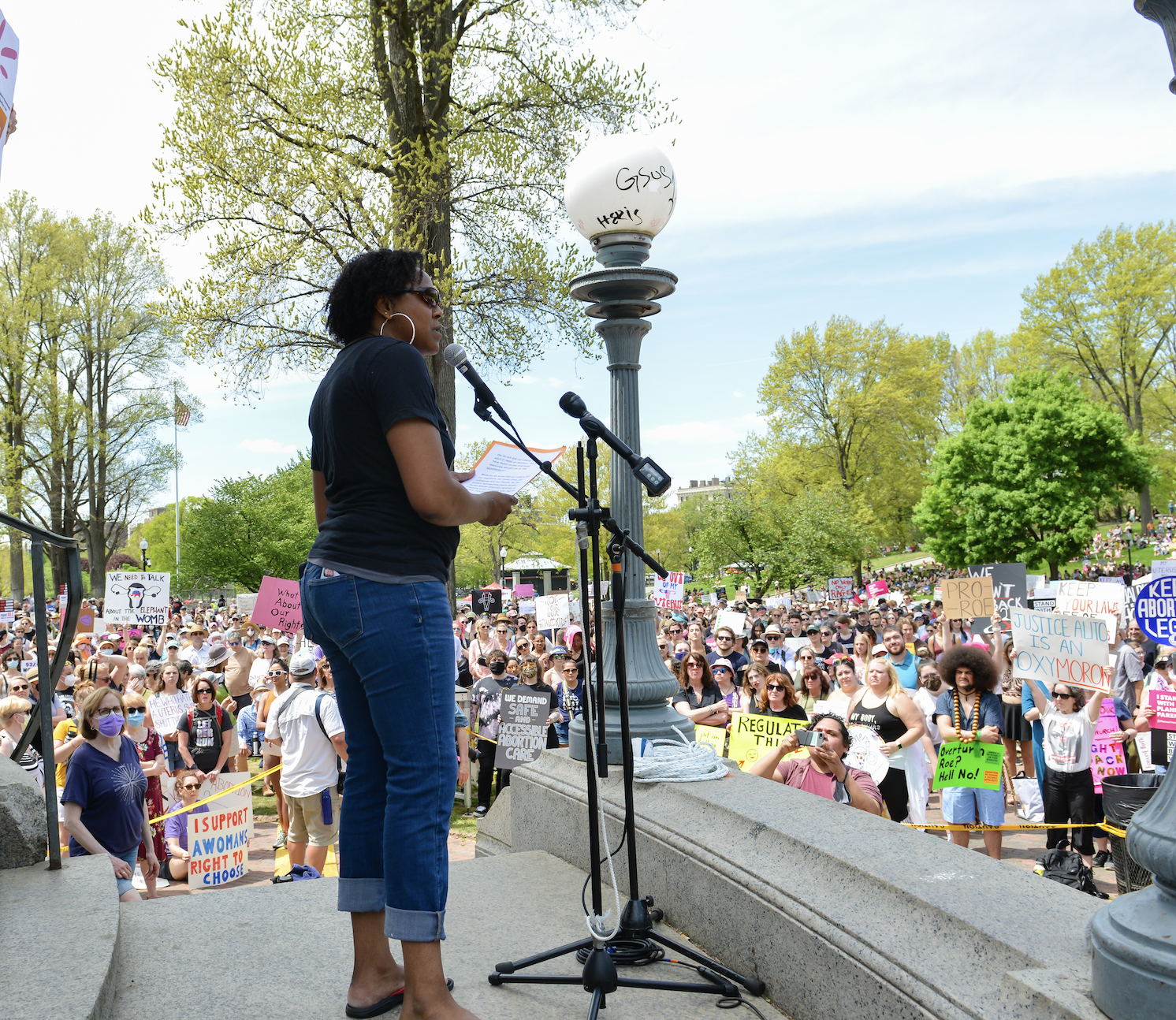


‘I cannot contain my rage.’ Abortion rights activists rally in Boston and across the country.

Our Legislative Response
June - August
At this moment of crisis, we were confident that Massachusetts could pave the way forward for abortion access and take meaningful action to promote reproductive freedom in the Commonwealth.
In July, Reproductive Equity Now and our partners in the Beyond Roe Coalition successfully advocated for a major reproductive health care law to make abortion more affordable and accessible, protect our reproductive and gender-affirming care providers, and ensure no one must leave the Commonwealth for care, at any point in their pregnancy.
Reproductive Equity Now’s Legislative Response to the Fall of Roe
In August, Vice President Kamala Harris touted Massachusetts’ reproductive health care law in Boston:
“You are leading by example. The work that is happening here in Massachusetts is a model of work that can and, we believe, should happen around the country."
Pictured: Kate Dineen for the Boston Globe
Kate Dineen was forced to travel out of state for an abortion in 2021. Her story inspired the Massachusetts legislature to make a statutory change to expand access to abortion care later in pregnancy in the state. Read Kate’s story in the Boston Globe.
Explore Our Reproductive Health Care Law
The Massachusetts legislature passed An Act Expanding Protections for Reproductive and Gender-Affirming Care in July 2022 that took steps to make abortion care more affordable and accessible and protect providers of abortion and gender-affirming care. Take a look at a few of the law’s historic provisions:
-
No person in Massachusetts should be turned away from care because they cannot afford it. That’s why the reproductive health care law passed in July included a requirement that insurance cover abortion and abortion-related care. The new law also ensures coverage is not subject to cost sharing. This is a major step to break down cost barriers to essential health care.
The law also included an important provision to expand access to care for Massachusetts college students, thousands of whom live in access deserts where the nearest abortion provider is an hours-long commute away. The new law requires Massachusetts public colleges and universities to provide access to—or referrals for—medication abortion where students spend their time: on campus.
-
As anti-abortion state legislatures force pregnancy within their borders and attempt to chill access beyond their borders, Massachusetts has an obligation to protect Bay State providers, patients, and helpers. That’s why we fought to include best-in-the-nation protections for Massachusetts reproductive health care and gender-affirming care providers from hostile out-of-state litigation. The law takes steps to shield providers’ professional licenses and malpractice insurance and prohibits extradition for the provision of legal in-state care, among several other protections. It also created a confidential address program for providers who too often face threats and violence for providing health care.
-
Emergency contraception is under attack from the anti-abortion movement. Anti-abortion extremist don’t just want to ban abortion – they want to restrict our ability to prevent unplanned pregnancy in the first place. That’s why we advocated for provisions in the reproductive health care law to expand access to emergency contraception. We wanted to ensure that every person could access the emergency contraception that’s right for them without delay, so we worked to include a statewide standing order for both prescription and over-the-counter emergency contraception, making insurance coverage—without cost-sharing—possible for all forms of emergency contraception at the point of sale.
We also worked to include a statutory fix to ensure over-the-counter emergency contraception can be sold in vending machines. Students at Boston University, Northeastern, Brandeis, and Harvard have already implemented these machines to help students access Plan B at cost and without delay.
-
At this moment of crisis, Massachusetts must be a beacon for reproductive freedom, not a state that forces people out of state for care at any point in their pregnancy. Yet even after passage of the ROE Act in 2020, that has been the case for some people and families who receive a devastating diagnosis later in pregnancy—like our friend Kate Dineen.
That’s why we fought in the reproductive health care law to clarify the 2020 ROE Act and ensure more comprehensive access to abortion care later in pregnancy within our state. We listened to the guidance of doctors who told us what they needed in statute in order to provide the best care possible. This language clarification is already having real-life, significant impacts for families faced with unimaginable diagnoses.
-
Our reproductive health law received national recognition, including a visit from Vice President Kamala Harris, who touted our work by saying, “You are leading by example. The work that is happening here in Massachusetts is a model of work that can and, we believe, should happen around the country." Reproductive Equity Now President Rebecca Hart Holder was even asked to introduce the Vice President and facilitate a roundtable discussion to talk about the impacts of our work. Our team also met with Senators Elizabeth Warren and Ed Markey to plan the congressional response to the fall of Roe, and joined Congresswoman Ayanna Pressley for a Town Hall to talk about our fight to protect abortion rights.

Abortion on the Ballot
August - November
Reproductive Equity Now proved that abortion is a winning issue.
In this November’s election, we showed that when candidates run on abortion, they win.
In Massachusetts, 140 Reproductive Equity Now-endorsed candidates won their elections, reaffirming voters’ strong support for state elected leaders who unequivocally support reproductive freedom. Reproductive Equity Now mobilized over a 100 volunteers throughout the general election, hosted several volunteer trainings, and filled 121 volunteer shifts during GOTV alone. Volunteers texted over 16,000 voters, sent over 3,000 postcards, and knocked hundreds of doors for endorsed candidates across the state. Reproductive Equity Now also traveled to New Hampshire to canvass and ensure Senator Maggie Hassan, Congressman Chris Pappas, and Congresswoman Annie Kuster returned to the U.S. Congress.
Our organization was focused on giving candidates the tools and resources to prioritize reproductive health care in their campaigns. We held two candidate message trainings to help our endorsed candidates talk about abortion access on the trail and message effectively with different constituencies.
This year’s election once again reminded us that the battle for abortion access will be fought and won in the states. From Massachusetts to Michigan, Kansas to Kentucky, state and local abortion advocates made historic progress flipping state legislatures and electing statewide leaders who are unafraid to stand up against anti-abortion attacks on health care. We have to continue to organize at the state level to elect candidates who will meet this fight where it’s at: in the states.

Reproductive Equity Now “By the Numbers”
In 2022, Reproductive Equity Now compiled a set of advocacy toolkits for activists across the country that offer recommendations for best practices when writing, advocating for, and implementing reproductive equity legislation.
Expanding Our Expertise
Supporters and Donors
We are tremendously grateful to everyone who has invested in our work. Without your financial support, none of our progress would be possible. On behalf of all of us at Reproductive Equity Now and the Reproductive Equity Now Foundation, thank you!
-
Karen Ansara
Sydney Asbury
Carrie Baker
Mary Kate & Richard Bluestein
Jen Bluestein
Adam Bookbinder
Margot Botsford & Stephen Rosenfeld
Dr. Lucy Chie
Howard Cohen
Robert Davoli
Andrea Deeker
Dr. Laurent Delli-Bovi
Kathryn Dixon
Senator Jamie Eldridge
Gail Epstein
Marjorie Findlay
Ellen Fisher
The Reverend Anne C Fowler
Nicki Gamble
Victoria Graboys
Happy Green
Rebecca Hart Holder & Molly Holder
Kimberly Haskins
Dr. Aaron Hoffman
Alan Huber
Stephen Kidder
Lisa Kimball
Melissa Kogut
John Kramer
Dr. Tara Kumaraswami
Andy & Nan Langowitz
Barbara Lee
Alan Linov
Shannon Liss-Riordan
Julia Livingston
Tucker McLane
John McQuillan
Thalia Meehan
Bonnie Moonka
Trina Moore
Michelle Morphew
Marianne Moskowitz
Elizabeth Munro
Emily Newmann
Karen O'Malley
John Page
Marsha Platt
Dr. Martha Richardson
Maria Robinson
Julia & Nate Sharpe
Cathleen & Jim Stone
Rebecca Stone
Emily Terry
Molly Turlish
Alyssa Vangeli
Katherine and Philippe Villers
Susan Webber
Susan Weir
Dr. Chloe Zera
National Institute for Reproductive Health
The Lalor Foundation, Inc.
Blue Cross Blue Shield of Massachusetts
Barr Foundation
Eastern Bank Charitable Foundation
The Boston Foundation
Grantham Mayo Van Otterloo & Co. LLC
New Venture Fund
Fish Family Foundation
William & Lia G. Poorvu Family Foundation
1199 SEIU Mass Political Action Fund
Charles & Francene Rodgers
Justice Catalyst
UMASS Memorial Medical Group, Inc
Massachusetts Association of Health Plans
Mass General Brigham
Jewish Federation of Greater Philadelphia
Crimson Lion Family Foundation
Claflin Family Fund
Wild Honey Pie
Hopewell Fund
Essex County Community Foundation
Joel & Randi Cutler Fund
Anonymous
Anonymous
Anonymous
Anonymous
-
In January 2021, Reproductive Equity Now launched the ACCESS Society, a group of reproductive equity champions who have committed to supporting Reproductive Equity Now with a new or increased gift of $10,000 or more, to be made every year for three consecutive years.
Thanks to a challenge gift from Debby and Jim Stein Sharpe of $100,000, the ACCESS Society has served as a critical basis of support as the organization has expanded its mission.
ACCESS Stands for: Abortion, Choice, Community, Equity, Support and Solutions. And thanks to our ACCESS Society members, that is exactly what we are striving to accomplish and protect everyday.
— Naomi Aberly
— Merle & Bonnie Berger
— Thalia Meehan
— Heather & Robert Keane Family Foundation
— Anonymous
— Benson & Norma Shapiro
This list will continue to be updated through the remainder of 2022.
Previous Annual Reports
2018 Annual Report
2019 Annual Report
2020 Annual Report
2021 Annual Report
How you can support Reproductive Equity Now:
-
Our mission is nothing short of ensuring true reproductive equity in Massachusetts and across this region. Please donate to support our fight.
-
Stay up-to-date on the latest in the reproductive equity movement by following us on social media.
-
Stay connected with email updates and informed on volunteering opportunities. Sign up to volunteer with our movement here.










